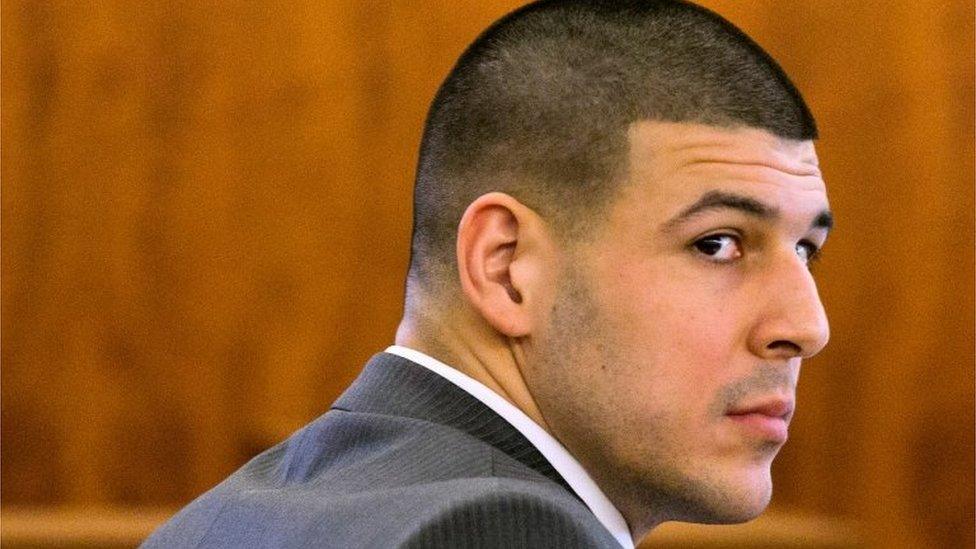Aaron Hernandez had 'John 3:16 on forehead' in jail suicide
- Published

Hernandez reportedly wrote "John 3:16" on his forehead before taking his own life
Former NFL footballer Aaron Hernandez was found with a Bible verse scrawled on his forehead after taking his own life, according to local media reports.
The former New England Patriots tight end hanged himself in his Massachusetts prison cell on Wednesday and was pronounced dead later at hospital.
The 27-year-old reportedly marked the gospel passage "John 3:16" in red ink on his forehead.
His death came five days after he was acquitted in a double murder trial.
New England Patriots deny Donald Trump snub
Hernandez had cried in court as that verdict was read, saying he was "very happy", but he was still serving a prison sentence for another murder.

Hernandez at one time was considered one of the top tight ends in the NFL
According to local media reports, Hernandez wrote the popular Bible verse on his forehead.
It refers to the phrase: "For God so loved the world, that he gave his only begotten Son, that whosoever believeth in him should not perish, but have everlasting life."
Massachusetts authorities later revealed three handwritten notes were also found next to a Bible in Hernandez's prison cell, though they did not disclose the content of the messages.
Does the NFL have a crime problem?
Hernandez - who had "God forgives" tattooed on his arm - had not been considered at risk of suicide, Mr Fallon added.
Massachusetts prisons have twice as many inmate suicides as the national average, federal data shows.
The state had an annual suicide rate of 32 per 100,000 prisoners from 2001-14, according to the Bureau of Justice Statistics, external. Only Rhode Island, Utah and Montana had higher rates.
Jose Baez, Hernandez's attorney, said the state medical examiner's office is "illegally" withholding the football star's brain despite family wishes to donate it to research.
Mr Baez told reporters on Thursday the family wants to donate the brain to Boston University's Chronic Traumatic Encephalopathy (CTE) Center, which studies the progressive degenerative disease that is found in people with a history of repetitive brain trauma.
The disease, which can only be diagnosed after death, has been found in the brains of dozens of former American football players.
Mr Baez expressed concern that any delay in releasing the brain to BU would compromise the study of it.
The medical examiner's office did not immediately comment after the news conference.

The rise and fall of Aaron Hernandez
June 2010: The tight end is drafted into the NFL from University of Florida and signs a four-year contract with the New England Patriots
January 2012: Hernandez sets a career best with 138 receiving yards in a victory over the Buffalo Bills
July 2012: Daniel de Abreu and Safiro Furtado are shot dead in Boston
August 2012: Hernandez signs a five-year, $40m contract with the Patriots
February 2013: Alexander Bradley files a lawsuit claiming Hernandez shot him in the face after a dispute at a Florida strip club
June 2013: Odin Lloyd, a semi-professional football player who dated the sister of Hernandez's fiancee, is found dead near Hernandez's home. He is arrested for the murder and dropped by the Patriots
May 2014: Hernandez is charged with first-degree murder in connection with Mr de Abreu and Mr Furtado's killings
April 2015: He is convicted of killing Lloyd and sentenced to life in prison
April 2017: The former footballer is acquitted of the 2012 killings of Mr de Abreu and Mr Furtado. But five days later, he kills himself

Hernandez was cleared last week of the murders of Daniel de Abreu and Safiro Furtado, who were shot dead outside a Boston nightclub in 2012.
But he was found guilty of illegally possessing a firearm and the judge added five years to his sentence.
Hernandez had been found guilty in April 2015 of the first-degree murder of his friend, another American footballer, the semi-professional Odin Lloyd, in 2013.
Lloyd's body was found with six bullet wounds less than a mile from Hernandez's home.
Within hours of his arrest for the 2013 shooting, the Patriots sacked Hernandez, considered one of the top tight ends playing the game.
Hernandez was given a life sentence without parole.
On the same day of his death, Hernandez's former team was honoured by President Donald Trump at the White House for their Super Bowl victory over Atlanta in February.